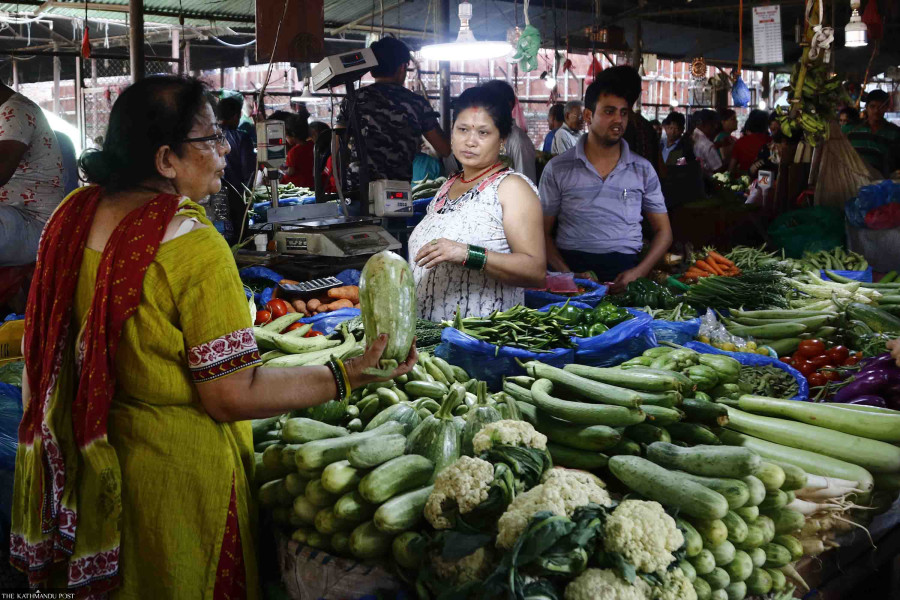Money
Winter drought pushes veggie prices higher
Amid low production, imposition of VAT on vegetable import has increased people’s kitchen expenses.
Post Report
The wholesale price of vegetables has increased by 26.96 percent within a year, which traders blamed on the imposition of 13 percent VAT on potatoes, onions and other imported items. The winter drought, too, contributed to the sharp rise in prices as production dropped.
Low yield often means high imports. And a hike in imports attracts taxes.
The average wholesale price of tomato, potato, onion, carrot, cabbage, cauliflower, green peas, pumpkin, squash, turnip, barela, arum, spinach leaves, cress leaves, mustard leaves, fenugreek leaves, onion greens, yam, broccoli, lettuce, fennel leaves and lime has increased sharply within a year.
The government has slapped 13 percent VAT on imported onions, potatoes, garlic, peas, sweet corn, frozen green leafy vegetables, collard greens, beans, spinach and other green vegetables.
Imported avocados, apples, quinces, apricots, cherries, strawberries, raspberries and cranberries, blueberries, kiwis and other fruits are also taxed.
The price of onion, which was available for Rs50 per kg before the budget last year, crossed Rs100 per kg after the government announced the tax. Potato prices also increased by 20 to 25 percent after the budget.
Dirgha Narayan Shah, proprietor of Shuvam Fresh Fruits and Vegetables, Balkhu, said that VAT has increased the price of vegetables.
“Vegetable output has declined while the demand is rising. Imports are ballooning,” said Shah, who also has a vegetable farm in Rautahat.
Vegetable production on his farm has declined due to a dry winter. “There was no rainfall. The prolonged cold wave was another factor in the dwindling production,” Shah added.
Over the year, the average wholesale price of squash (long and round) has jumped over three-fold, to Rs75 per kg.
The average wholesale price of onion has increased by 85.91 percent to Rs67.67 per kg. The price of onion greens has increased by 43.47 percent to Rs110 per kg.
Cabbage wholesale price has increased by 86.69 percent to Rs32.67 percent over the year. The price of locally grown cauliflower has increased by 36.98 percent and reached Rs37.67 a kg while cauliflower from the Tarai increased 27.6 percent to Rs22.33.
The average wholesale price of all varieties of tomatoes has increased sharply. Tomato big (Nepali) price has increased by 14.7 percent to Rs65 per kg, tomato big (Indian) by 32.35 percent to Rs75 per kg, tomato small (Indian) by 7.27 percent to Rs29.50 per kg and tomato small (Tarai) by 22.98 percent to Rs29 per kg.
The wholesale price of carrots (local) has increased by 25 percent to Rs35 per kg while carrots (Tarai) now cost 78.23 percent more—Rs32.67 per kg.
Green peas have become costlier by 46.15 percent, selling for Rs95 per kg after a year. Similarly, pumpkin prices have increased by 42.86 percent to Rs50 per kg.
The price of green leafy vegetables has also become expensive in the past year.
The wholesale price of spinach leaves has increased by 32.35 percent to Rs75 per kg, cress leaves by 32.35 percent to Rs75 per kg, mustard leaves by 26.67 percent to Rs38 per kg and fenugreek seedlings by 32.35 percent to Rs75 per kg.
Broccoli's average wholesale price has increased by 44.44 percent to Rs65 per kg.
The price of lime has increased by 60.57 percent to Rs263.33 per kg.
According to Nepal Rastra Bank, Nepal imported vegetables worth Rs7.75 billion in the first six months of the current fiscal year ended in mid-January, compared to the same period last fiscal year.
The country imported vegetables worth Rs16.88 billion in the last fiscal year. Nepal imports vegetables mainly from India.
The year-on-year consumer price inflation moderated to 5.26 percent in mid-January 2024 compared to 7.26 percent a year ago, according to the central bank’s macroeconomics report.
Inflation in vegetables declined by 1.04 percent in the review period.




 13.12°C Kathmandu
13.12°C Kathmandu












